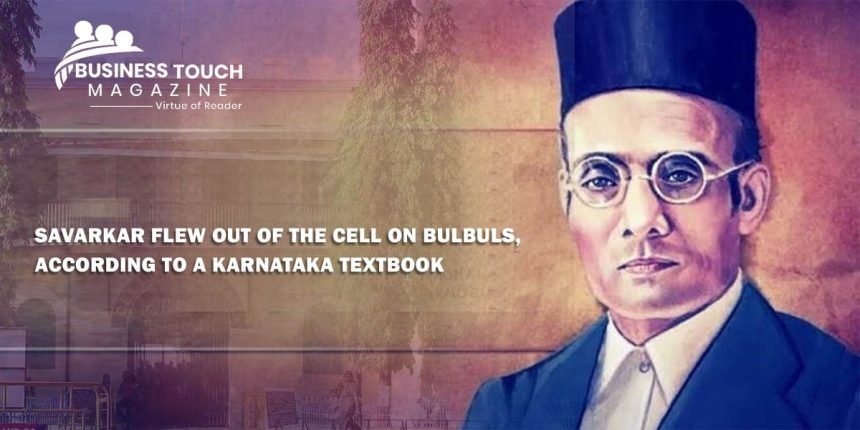The panel charged with revising state textbooks has clarified that a passage implying the Hindutva ideologue soared on a bird is a figure of phrase.
Several professors and the Congress have raised concerns over a Kannada textbook for eighth graders that they say glorifies Hindutva thinker Vinayak Savarkar.
Analyzed here is a passage from KT Gatti’s travelogue Kalavannu Geddavaru, in which the author visits the Andaman cellular jail and portrays Savarkar’s existence behind bars.
There was no keyhole in Savarkar’s cell, according to the passage. Nonetheless, bulbul birds would sometimes drop by, and Savarkar would perch on their wings to make his daily trips back home.
This lesson is a replacement for Blood Group, which was written by Vijayamala Ranganath.
Certain elements of a lesson on Vinayak Damodar Savarkar in the Class 8 Kannada textbook have drawn criticism as an effort to “glorify the independence warrior,” adding fuel to the fire that has been burning since the textbook revision process performed by the Karnataka government.
The relevant textbook is a book written in a language other than Karnataka’s official one, and thus is now unavailable for viewing by the general public. The contentious part begins: “Savarkar’s jail cell lacked basic amenities like a lock.
However, bulbul birds now sometimes stop by. Savarkar would ride out on their wings to the homeland on a daily basis.” After this chapter that serves as an introduction to Savarkar for students, there is an excerpt from KT Catti’s travelogue about the Andaman Islands.
According to the Kannada textbook published by the government of Karnataka and used in public schools from 1911 to 1921, this was VD Savarkar’s daily routine.
Made Gowda, managing director of KTBS, was approached about the issue and responded by saying he has not seen the video and has to speak with the team responsible before making any more comments.
A member of the now-defunct Karnataka Textbook Revision Committee told The News Minute on Sunday that the section was a metaphor. But several educators have complained that the passage is worded in the literal meaning, making it difficult to explain in the classroom, as reported by The Hindu.
There is no problem with it if the writer has lauded Savarkar figuratively, as one professor put it. However, the words read as if they were taken at face value. This is really challenging to convey to the pupils. So, how do we handle it if the kids have doubts and want evidence?
Representative for the Congress party Priyank Kharge said that the statement did not read as a metaphor.
According to Deccan Herald, the Karnataka Textbook Revision Committee also claimed to have received oral objections about the passages in question.
The head of the Karnataka Textbook Revision Committee, Rohith Chakratirtha, was quoted in The Print on Sunday as saying that some people’s intelligence has plummeted so low that they cannot grasp the meaning of a figure of speech.
He said that the phrase “Savarkar used to fly to the motherland perched on the wings of a bird” does not suggest that Savarkar flew to India in this manner. But if our so-called intellectuals can find fault with this phrase, there must be something wrong with their intelligence.
BC Nagesh, minister of education of Karnataka, confirmed that the author’s account of the lecture is correct. Savarkar is a tremendous liberation warrior, Nagesh told and no amount of praise can make up for what he gave up.




